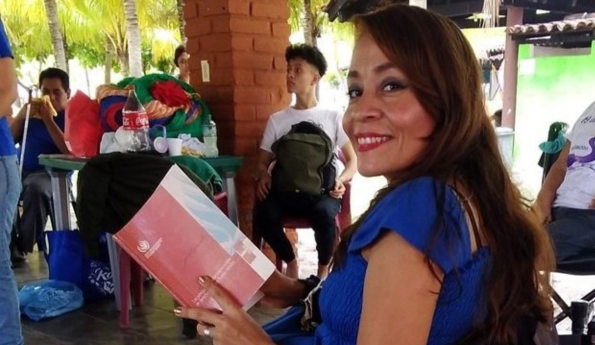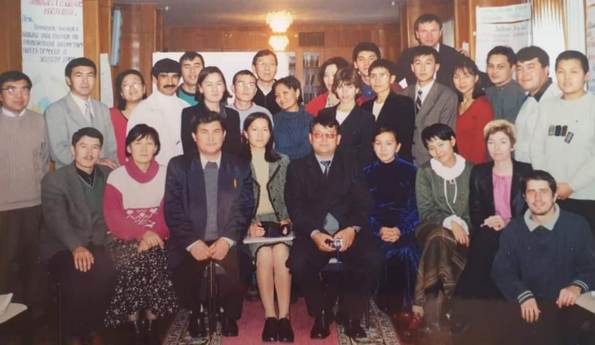
On December 7, Counterpart International joined nearly 50 democracy organizations form around the world for the Global Democracy Coalition Forum, a global multi-stakeholder coalition that gathered in a 24 hour virtual forum. The Forum, convened by the International Institute for Democracy and Electoral Assistance (IDEA), aimed to galvanize a global conversation on democracy and develop recommendations for strengthening democratic institutions and addressing democratic backsliding around the world as inputs to the Biden Administration’s Summit for Democracy held on December 9-10.
The Global Democracy Coalition Forum provided an important space for over 240 civil society leaders, human rights activists, journalists, and researchers to gather, debate, and help inform the Summit’s efforts to advance the future of democracy around the world. Counterpart partnered with RNW Media and American University’s Accountability Research Center in facilitating two webinars as part of the Forum, “If Facts Don’t Matter, Then What”? and “Can Social Accountability Rebuild Democracy From the Ground up?” Other sessions covered elections, women’s political participation, disinformation, transnational repression, the state of democracy globally, in the United States, in Africa and in the Pacific, the role of youth, corruption and malign finance, democracy and development, freedom of expression and the role of a free media, among many other topics.
In the two days following the Forum, the Biden Administration’s Democracy Summit focused on three themes: defending against authoritarianism, addressing and fighting corruption, and promoting respect for human rights. It is being held at a time when democracy is in recession around the world, less than 9 percent of the world’s population living in a “full democracy” and more than a third living under authoritarian rule, according to the Economist Intelligence Unit’s Democracy Index 2020 report. This inaugural Summit will turn into a year of action in 2022, which Counterpart International looks forward to contributing to. The Summit and ensuing year of action focus on challenges and opportunities facing democracies and provide a platform for leaders to announce both individual and collective commitments, reforms, and initiatives to defend democracy and human rights at home and abroad.
Recordings from all the Forum webinars and recommendations can be accessed on the Global Democracy Coalition website as a repository of knowledge resources on democracy. Ideally, the multi-stakeholder coalition will continue to collaborate beyond the 2021 Summit, ahead of the 2022 Summit and beyond, and continue placing democracy front and center of the global agenda, learning from each other and sharing lessons learned and good practices in on how to advance, nurture and protect democracy worldwide.
Below you can see the highlights of the two webinars Counterpart International organized: If Facts Don’t Matter, Then What”? and “Can Social Accountability Rebuild Democracy From the Ground up?”.
“When Facts Don’t Matter, Then What?”
Counterpart and RNW Media gathered key thought leaders for an in-depth session on countering disinformation around the theme of “When Facts Don’t Matter, Then What?”
Featured speakers included:
- Susan Abbott, Counterpart International
- Slobodan Blagovcanin, Coordinator, Citizens Against Terrorism (CAT), Tuzla, Bosnia and Herzegovina
- Marius Dragomir, Director Center for Media, Data and Society, Central European University
- Adam Kaplan, Independent Consultant
- Jacqueline Lampe, CEO, RNW Media
- Vukasin Petrovic, Chief of Party, Information Access Fund
- Bruce Sherman, Strategic Adviser, RNW Media (Moderator)
Summary of webinar: The breakdown in the information order, clearly evident in the ubiquity of mis-, dis-, and mal-information (MDM), is central to the challenges facing democracies. Unfortunately, we find ourselves in a polarized world that necessitates rethinking our assumptions and remedies regarding countering MDM and ultimately mediating differences in democratic societies. While fact checking, pre- and de-bunking, and media literacy training are parts of the solution, new and innovative approaches that reconsider our assumptions concerning the primacy and power of facts might also help. If we are not able to fix our information disorder then how might media help strengthen and sustain democracy?
Beyond the variety of institutionalist approaches being considered, ranging from regulatory reforms to fix digital information marketplaces, to research that examines how audiences access and process information, to new youth-driven and -focused outlets that target specific topics to counter MDM, the panelists suggested alternative concepts. These included values-based social impact entertainment and cultural programming, platforms and for a for consensus-seeking discussions rather than moderating the specific content of those discussions, adoption of collaborative media/civil society/government co-governance models to mitigate the destructive impact of information disorder on civil discourse, and building digital communities based on pluralism and trust that support media of difference and serve to ward off MDM. As we look toward the future, these recommendations emerged:
RECOMMENDATIONS:
- With democracy at stake, there is a need to reconsider the conventional delineation between issues-focused civil society and the fetishization of an unachievable perfectly objective media. Deeper collaboration and synergies between media and civil society embracing the higher cause, the promotion of democratic norms and values, would buttress ways to understand, identify and reinforce shared values and spaces for mediating differences.
- A reconsidered research agenda around “countering disinformation” might consider the incentives in the present information and media ecosystem and market that contribute to disinformation and its devastating effects on civil discourse. In particular, taking a critical look at assumptions media providers and journalists make about audience preferences and behavior would be helpful as well as how to address media market failures that reinforce divisiveness, polarization, and the splintering of identities and values. In this regard, disinformation is considered more of a symptom of a larger problem rather than something that can be eradicated on its own. The research agenda could consider: Efforts to map out communities working mediating differences; An assessment of how people get their news and information, paying special care to critically examining all historical assumptions; Evidence-based understandings of how information and media can mediate difference.
- Highlight alternative media approaches, particularly in the developing and post-communist world, that have proven successful in helping to mediate differences in society despite widespread MDM, information disorder, and dysfunctional political systems. While we in the West deplore the breakdown of information integrity, others in the world have never known it and yet, or maybe because it was never assumed, have found ways to overcome it. We can and should learn from and support them.
“Can Social Accountability Rebuild Democracy from the Ground Up?”
Counterpart International partnered with American University’s Accountability Research Center building on ongoing social accountability work for a discussion of “Can Social Accountability Rebuild Democracy from the Ground Up?”
Featured speakers included:
- Naomi Hossain, Research Professor at Accountability Research Center, American University
- Christian Arandel, Counterpart International
- EhiIdakwo, Programs & Learning Manager, Accountability Lab, Nigeria
- Andrew Lavali, Executive Director, Institute for Governance Reform, Sierra Leone
- Maria Baron, Global Executive Director, Directorio Legislativo
- Susan Abbott, Counterpart International (moderator)
- Nick Benequista, Sr. Director, Center for International Media Assistance(respondent)
- Craig Hammer, Program Manager with the Development Data Group at the World Bank (respondent)
Summary of the webinar: Dialogue between activists, practitioners, and researchers from around the world, organized by Counterpart International and the Accountability Research Center, American University.
Democracy may be in retreat globally, but locally, people are organizing in new ways, greater numbers and with ever more creative strategies. Can social accountability – or citizen-led efforts to hold governments accountable beyond the ballot box – help reverse mass discontent and a loss of political trust? This panel found reasons for optimism based on experience from around the world that sustained efforts by organized citizen groups can help build trust, demystify government, and hold wrongdoing to account. Supporting social accountability initiatives is no quick or easy answer to the democratic deficit. But if led by grassroots actors who are enabled to set the action agenda to fit their contexts, social accountability can help bring democratic practice into everyday life, enacting values and strengthening institutions that guard against disinformation, authoritarianism, and abuses of power.
Social accountability can rebuild democracy. It is not enough for citizens to demand socio-economic changes. In fact, governmental officials need to have the desire to make the necessary changes being requested by their constituents and to also have the tools to ensue short- and long-term changes. Some of the most effected citizens are far removed from the decision makers. They are most concerned about what affects them locally and on a day-to-day basis. Removing the barriers of accessibility – such as hosting town halls and organizing diverse advocacy groups made up of community champions, women, youth, journalists to coordinate sustainable working groups – between government officials and citizens will ensure a better understanding of the local needs and how best to address them. Moreover, fostering this type of relationship builds accountability, transparency, inclusion, and trust. As social accountability practitioners, we believe that localization is a key factor in ensuring that community challenges are addressed and met with sustainable solutions. We uphold our roles as partners with different stakeholders and foster the concept of collaboration with them to decrease stove piping and include more representation at the table. We believe that democracy thrives in these contexts.
RECOMMENDATIONS:
- Support social accountability as a direct route to rebuilding democracy from the ground up. Even where civic space is restricted and political opposition constrained, through social accountability, citizens can – and do – gain new capacities and knowledge, relationships and civic muscle through the work of monitoring and holding government accountable.
- Recognize rebuilding democracy needs independent social movements, not donor-dependent projects. Support to social accountability needs to be flexible and long-term, and to ensure local actors and local knowledge set the agenda. It needs to build resilient civil society, able to resist anti-democratic forces and agendas. Importance for movements to become more sustainable and permanent. Create different approaches of shifting from projects to longer term movements
- Do no harm. Supporting social accountability movements means abandoning ‘one-size-fits-all’ solutions in favor of locally-grounded, context-driven actions and agendas. Social accountability initiatives must be determined by those who know and are alert to the risks and possibilities in the political environment. Do No Harm approach needs to be applied within all activities. When funding movements and social accountability work, we need to generally think about the context, but also the long-term effects. Short-term, episodic funding may do more harm than good. There is a necessity to better understand the grassroots context and needs, as well as parliamentarian political interests, to increase synergies between different groups and solutions to local problems. More focus on localization needs to occur that includes the local social accountability of CSOs, media, women- and youth-led groups, human rights groups, etc to drive the agenda. Diminishing the barriers so that more citizens can participate and play a role is key in ensuring that this occurs.




